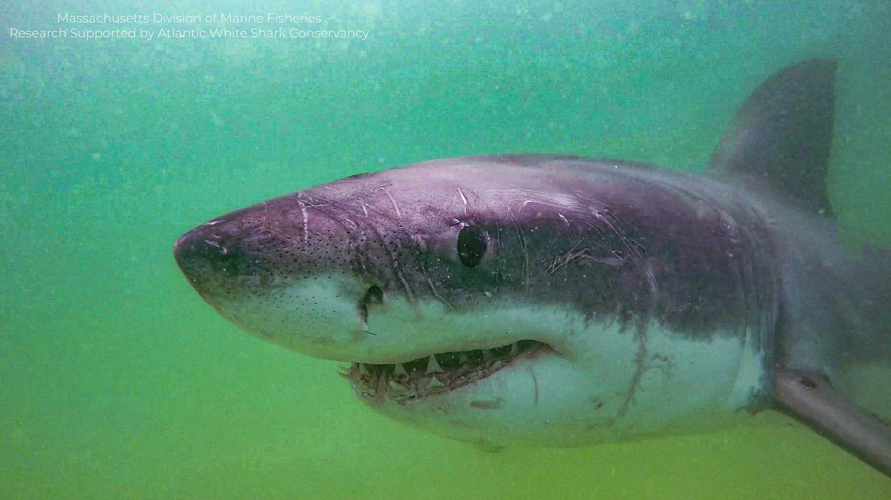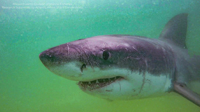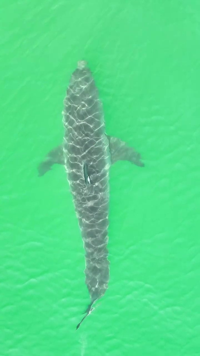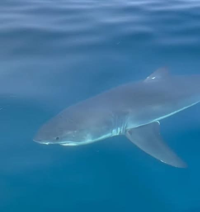
(Atlantic White Shark Conservancy via SWNS)
By Michael Lee Simpson
A shark biologist expects a surge in great whites this fall - as they arrive into Cape Cod later than usual.
Greg Skomal, 64, a shark biologist for the Massachusetts Division of Marine Fisheries, says they are expected to peak in September and October instead of summer.
The New Bedford researcher, who has been studying the apex predators for nearly two decades, says the seasonal shift is linked to the expansion of seal populations further north, prompting sharks to bypass Cape Cod on their migration.
While shark numbers may be leveling off, Skomal notes the importance of education and awareness for fall beachgoers, noting that humans are not their prey.
"The last couple of years, we've noticed that June, July, and August, they're not as abundant as they were when they first started reappearing on Cape Cod," Skomal said.
"The numbers have been down in those months, but we do still see the high numbers in September and October."
The trend marks a departure from the broader pattern that has defined Cape Cod's shark story over the past two decades.

(Atlantic White Shark Conservancy via SWNS)
Skomal says that "over the course of the last 50 years, we have seen an increase in the number of white sharks visiting the shorelines of Cape Cod," with the phenomenon taking off in the early 2000s.
But the recent seasonal shift suggests the predators are adapting their migration patterns in ways that could have implications for both marine ecosystems and human safety.
"What I think is happening is many of these sharks are bypassing Cape Cod now on their migration north, and they're moving to parts north, so they're going to Canada, they're going to the coast of Maine," Skomal said.
The researcher draws an analogy to human behavior to explain the phenomenon.
"It's almost like you get a new restaurant that opens and everybody flocks there, and then you realize that it's challenging to be there,” he said.
“So it settles out at a lower number of customers that actually end up going there."
Cape Cod's waters became a shark hotspot due to the restoration of seal populations, which serve as the primary food source for great whites.
But as seal populations have expanded northward, the sharks have more dining options along their migration route.
"Cape Cod basically represents the first one on their way north because it has seals in big numbers," Skomal said.
"As you move north, you continue to encounter seals in big numbers, so white sharks will continue on and perhaps not visit Cape Cod as frequently as they once did."
The numbers from Skomal's research team paint a picture of how significant Cape Cod's shark population became during peak years.

(Atlantic White Shark Conservancy via SWNS)
Between 2015 and 2018, researchers calculated that 800 individual sharks visited the area, "which makes it one of the highest densities of white sharks in terms of population abundance anywhere in the world for that period," he said.
But recent data suggests those peak numbers may be leveling off.
"Based on the number of sharks that we've tagged and the number of those tags that are coming back year after year, it looks like since 2020, 2021, the number visiting Cape Cod has gone down a bit," Skomal said.
The seasonal shift also has safety implications.
While shark attacks remain extremely rare, Massachusetts experienced its first white shark attacks since 1936, beginning in 2012, with incidents in 2012 and two in 2018, including one fatality.
"The reason the white sharks are coming back in bigger numbers over the last 20 years is because of the restoration of their natural prey, and that is seals," Skomal said.
"The sharks are in these near-coastal areas to feed on those seals, where humans are also using those areas."
For those still venturing into Cape Cod waters during the fall months, Skomal stresses the importance of education and awareness.
His team shares data through the Shark Activity app, which helps people understand where encounters are most likely to occur.
The researcher also works to dispel misconceptions about great whites as indiscriminate man-eaters, particularly as the 50th anniversary of "Jaws" continues to influence public perception.
"Our studies and those of others indicate that white sharks don't prefer to feed on human beings," Skomal said.
"If they did, we'd have a lot of shark attacks. Humans are not on their menu, and when they do bite humans, it's a mistake."



















(0) comments
Welcome to the discussion.
Log In
Keep it Clean. Please avoid obscene, vulgar, lewd, racist or sexually-oriented language.
PLEASE TURN OFF YOUR CAPS LOCK.
Don't Threaten. Threats of harming another person will not be tolerated.
Be Truthful. Don't knowingly lie about anyone or anything.
Be Nice. No racism, sexism or any sort of -ism that is degrading to another person.
Be Proactive. Use the 'Report' link on each comment to let us know of abusive posts.
Share with Us. We'd love to hear eyewitness accounts, the history behind an article.